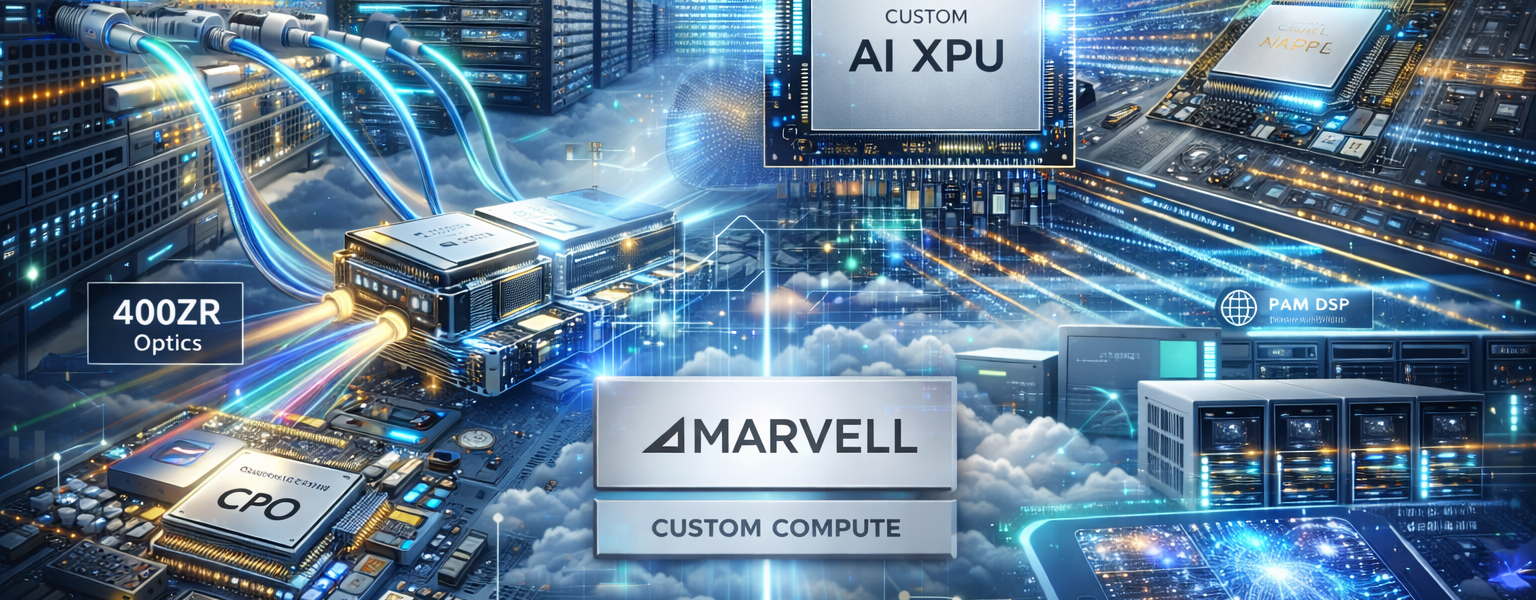Custom Compute, Custom Growth: How Marvell Is Powering Next-Gen AI Infrastructure
Building Infrastructure Through Innovation
Founded in 1995 and based in Santa Clara, California, Marvell Technology Group has steadily evolved from a storage and networking chipmaker to a strategic force in semiconductor infrastructure. After key acquisitions—Cavium (2018), Aquantia (2019), Inphi (2021), and Innovium (2021)—the company now stands as a fabless leader in data centres, cloud, and AI-enabled computing. It blends analogue, mixed-signal, and digital signal processing in scalable system-on-chip architectures to meet evolving infrastructure demands.
A Reinvention Fueled by AI and Data Centers
Marvell’s reinvention is most evident in its recent quarter:
- In Q4 FY 2025, the company recorded a 27% year-on-year revenue increase to $1.817 billion, driven by a 78% surge in data centre sales, which made up 75% of total revenue.Marvell
- Margins were robust: a non-GAAP gross margin of 60.1% with ongoing volume production of its custom AI silicon and interconnect technologies.
- Operating cash flow for the year reached $1.68 billion, illustrating the company’s ability to convert growth into financial strength while returning $933 million to shareholders through dividends and buybacks.
Strategy That Catalyzes Growth
Custom silicon initiatives are central to Marvell’s upward trajectory:
- Their AI chip programs have entered volume production, reflecting deepening relationships with hyperscalers like AWS, Google, and Microsoft.
- Following a strategic investor event, Marvell raised its total addressable market (TAM) forecast to $94 billion by 2028, with custom AI chips making up $55 billion of that expansion. Management targets capturing 20% of that opportunity.
- Analyst optimism runs high: JPMorgan estimates $4 billion in AI-related 2025 revenue, with Marvell bringing networking and computing into focus.
Market Reaction: Expectations vs Execution
Even amid strong results, market dynamics remain volatile:
- After the Q4 beat-and-guide report, Marvell’s stock tumbled over 16% in after-hours trading—despite earnings coming in slightly above expectations ($0.60 non-GAAP EPS vs. $0.59 estimate).
- Investor sentiment is also shifting. Some see Marvell emerging as a viable alternative to GPU-dominant players like Nvidia, particularly for custom AI infrastructure.
- Yet stock performance has lagged broader indices, plunging more than 34% year-to-date, highlighting concerns around competitive pressures and market share dynamics.
The Competitive Edge and Future Landscape
Marvell differentiates itself through:
- Integrated infrastructure IP ranging from custom accelerators (XPUs) to advanced interconnects, including PAM DSPs, 400ZR optics, and Co-Packaged Optics (CPO).
- A hyperscaler-validated strategy, delivering custom AI chip solutions in volume for some of the world’s largest data centre customers.
- Clear financial discipline—with record cash flow and returns—even while transforming its business.
Challenges and Strategic Imperatives Ahead
Marvell’s path forward hinges on execution amidst turbulent expectations:
- Investor expectations are high—modest guidance misses trigger big market moves.
- Competition is ramping up—industry giants and specialised ASIC designers are vying for the same hyperscaler deals.
- Marvell must continually deliver performance, efficiency, and developer-friendly solutions to stay ahead in custom silicon adoption.
Anchoring the AI Infrastructure Revolution
Marvell isn’t just another chipmaker—it’s building the foundation of scalable, efficient AI infrastructure. Its custom AI programs, data centre optics, and compute momentum speak to a company reimagining semiconductors for the age of AI and cloud.
If Marvell can translate its pipeline into sustained profitability—and narrate that story convincingly—it stands to redefine how hyperscale compute gets built.





















